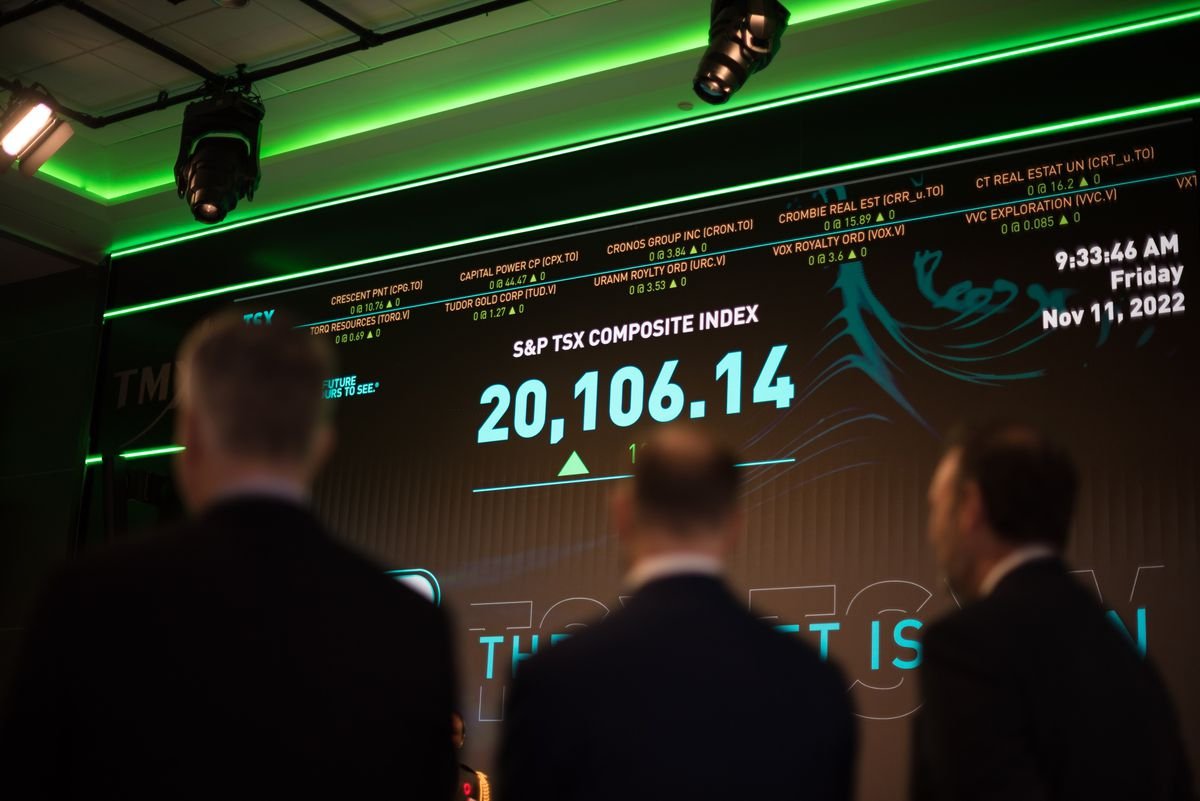“TSX Parent Company Seeks Global Expansion and Data Revenue Growth”
The S&P TSX composite index screen at the TMX Market Center in downtown Toronto on November 11, 2022.Tijana Martin/The Canadian Press
The operator of Canada’s main stock exchange plans to generate the majority of its revenue from overseas and traditional stock exchange business.
TMX Group Ltd., XT, which owns the Toronto Stock Exchange, the TSX Venture Exchange, the Montreal Exchange and the TSX Alpha Exchange, late Monday announced three long-term “transformation goals” along with broadly consistent financial results for the final three months of 2022 .
The new targets, which TMX expects will take a decade or more to fully achieve, come amid analyst concerns about the company’s near-term ability to grow earnings under persistently volatile market conditions.
TMX aims to generate more than half of its revenue outside of Canada and an equal share from its market data business. Today, no segment accounts for more than a third of sales.
TMX Group sees revenue and earnings increase in the fourth quarter of 2022, the full year
The company also aims for two-thirds of all annual revenue to be recurring, such as annual listing fees and data subscriptions. That would be an increase of about 50 percent today.
In the most recent quarter, 44 percent of TMX’s revenue came from trading, clearing and settlement services, which are highly sensitive to fluctuations in market conditions.
“In these transformational chunks, we’re seeing the long-term transformation of the business toward more global, recurring revenue and more data,” Chief Executive Officer John McKenzie said in an interview about the strategy. “We wanted to show what long-term success looks like.”
The company plans to grow its market data business faster than in the past, McKenzie said, in part through acquisitions. In November 2022, TMX bought Boston-based corporate events Data provider Wall Street Horizon for an undisclosed sum. In January, the company paid $175 million for a 21% stake in New York-based VettaFi LLC, which provides data services and analytics related to exchange-traded funds and global indices.
TMX also plans to lean heavily on another relatively recent acquisition to boost sales in the near term. In 2017, the company bought London-based wholesale energy platform Trayport Ltd. for nearly $1 billion, and price increases for Trayport customers, which took effect in late 2022, are expected to increase overall sales by 7 percent to 8 percent in 2023.
Mr McKenzie hopes such growth prospects will offset investors’ concerns about market volatility after what he described as a “turbulent and difficult” 2022 in a conference call on Tuesday morning. He also acknowledged on the conference call that “some of these challenges will remain into the wee weeks of 2023.”
Scotiabank analyst Phil Hardie, who covers TMX with a price target of $160 per share and the equivalent of a “hold” rating, is among those urging investors to stay on the sidelines. In a note to clients on Tuesday, Mr. Hardie said he expects TMX to post a year-over-year decline in earnings per share — a key measure of profitability — over the next three quarters before returning to growth.
The issue, Mr Hardie said, “relates to the uncertainty in the medium-term outlook for capital markets activity and what the ‘new normal’ for trading and financing might look like given volatile market conditions.”
In response, Mr. McKenzie said he understands that kind of hesitation, but that it’s “one of the interesting resiliencies in our business model [is that] Different market conditions can be headwinds in some areas of the business and tailwinds in others.”
For example, rising interest rates have been a headwind in terms of the valuation and pricing of transactions, he said. However, they were positive for the TSX Trust business, which provides transfer agent and custodian services. According to National Bank Financial, for every one-fourth percentage point increase in the Bank of Canada’s overnight rate, the TSX Trust’s annual revenue will increase by approximately $2.5 million.
“Even in the capital raising business, debt refinancing is now more expensive than it used to be and the equity alternative looks more attractive when we are in a market of persistently higher interest rates,” Mr. McKenzie said.
“All of these parts now have headwinds and tailwinds as well, and that has made our business so much more resilient in 2022 than we would have been in 2012.”
Source: www.theglobeandmail.com
Don’t miss interesting posts on Famousbio










